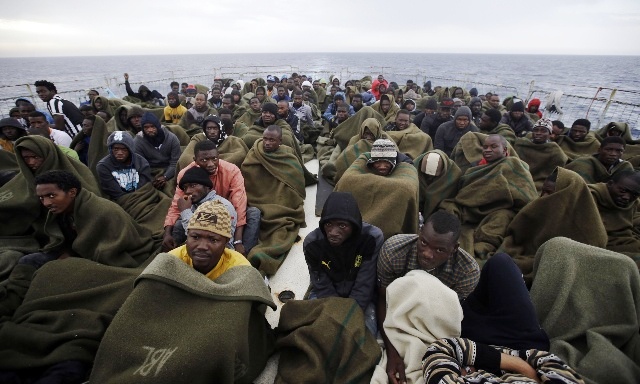Under the EU’s exacting standards, several sectors of the Baltic economies were placed on the chopping block. Most factories that the EU deemed uncompetitive were either shut down or converted. The list of industries decimated in Latvia, for example, included fishing and fish processing, textiles, shoes, and electronics. The sugar industry was also completely gutted.
And now the policies of sanctions, plus Russia’s countermeasures, are adding to the economic woes in the Baltics. For example, the Baltic News Service reports that between January and July of 2015, Lithuania exported 54.7% fewer goods to Russia than during the same period in 2014. Lithuanian exports of milk and dairy products fell by 94.2%, and no meat or meat products have been exported to Russia this year at all. The Lithuanian Ministry of Finance stated that they had failed to find an alternative to the Russian market. And we might add: they will continue to fail.
Rising unemployment has resulted in a massive exodus, especially among younger generation. Latvia and Lithuania have lost about 20% of their populations. The Estonian population has decreased by 5.5%.
Up to a certain point, the citizens of these Baltic nations – which (with the exception of Lithuania) had never before enjoyed true sovereignty – were still able to mentally justify all these sacrifices by clinging to the comforting idea that they were now bona fide members of the “great family of European nations.” It seemed that in the EU they were “equal among equals.” They were heartened by their Americanized consciousness of their new, historic mission – to stand on the front lines of the battle between the “civilized world” and “aggressive and barbaric Russia.” At the same time they were inspired by their crusade against their “internal enemy” – the Russian “non-citizens” who thought of nothing but how to again restore Moscow’s colonial yoke over the freedom-loving Baltic people.
But once the Western part of the continent was engulfed by a wave of refugees, the attitudes of these inhabitants of the outskirts of Europe reached a tipping point. The refugee problem in the Baltics emerged when those nations were assigned migrant quotas. Here they come – wanted or not.
At first the numbers seemed modest enough. In July, officials in Riga indicated their willingness to accept 250 migrants, Tallinn – between 84-156, and Vilnius was to take only a few – between 50 and 60.

But September arrived and the mood of the European Commission shifted. In July the EC had agreed to admit 40,000 refugees into the EU, divvying them up among 28 different countries, but now Jean-Claude Juncker is insisting that that figure be quadrupled. The quotas for the “young Europeans” of the Baltics were also revised. Now Latvia must accept 776 refugees, Lithuania – 1,105, and Estonia – 523. Brussels had already brandished its iron fist in warning: Juncker announced that the quotas for the EU member states were mandatory and that any country refusing to accept the migrants would be subjected to financial sanctions.
And that’s when it began…
Kristiina Ojuland, an MEP and the former foreign minister of Estonia, criticized the “politically correct drivel” coming from the European Union and proclaimed a “threat to the white race.” Latvian society launched into a debate about who is worse – Africans or Russians. Latvia’s former minister of defense, Artis Pabriks, who is also an MEP, explained that Latvia cannot accept Africans, as his country suffered so cruelly when it was violently colonized by the Russians.

The Baltics have been beset with nationalist protests. Refugees arriving at a reception site in the Estonian village of Vao were met by a demonstration of protesting local residents, a motorcycle rally consisting of hundreds of bikers, and proud Estonians wearing T-shirts emblazoned with the image of the Norwegian mass murderer Anders Breivik. The refugee reception center itself was set on fire by some of the villagers.
Juncker’s quotas are merely the first step on a long staircase that goes nowhere but down. These “young Europeans” from Estonia, Latvia, and Lithuania will also have to answer for their part in America’s military adventures, for “Atlantic solidarity,” and for the devastation of the Middle East.
They thought Russia was an Asian interloper in Europe. But now they’ll get a real taste of Asia, in addition to Africa, right where they live.









